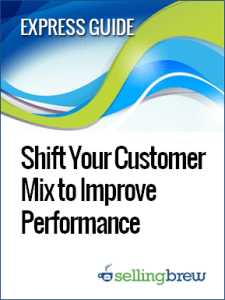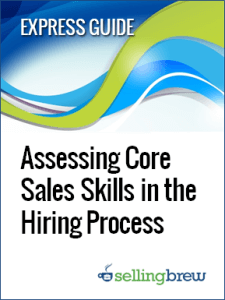When you are a sales ops practitioner (and especially if you are fairly new to the discipline), it’s easy to fall into the trap of thinking that your company’s problems are completely different than the problems that other B2B firms are facing. And when you think that way, it’s easy to become overwhelmed. It may seem like your company’s problems are insurmountable. That no matter what you do, your company will continue to make the same mistakes it has always made.
Here at SellingBrew, we have the opportunity to interact with sales and sales ops folks from a huge variety of companies and industries. And that gives us a slightly different perspective.
While every company is unique, B2B firms frequently encounter very similar problems. And these issues are not insurmountable! Businesses across the country are successfully tackling these obstacles and overcoming them.
So what are these similar problems that B2B firms run into all the time? Here are four challenges that we see very frequently, along with some resources that can help you solve them.
- Not communicating value. At many B2B firms, the marketing and sales teams are not successfully explaining the differential value of their products. In other words, they aren’t telling people why the things you sell are better than similar products sold by other companies. Often the first sign of this problem is eroding margins. Salespeople find themselves unable to defend their prices, and as a result, they end up offering discounts. When you see that salespeople aren’t hitting their target prices, don’t just assume they’re doing a bad job. Continue investigating and asking why. You may find that the true root problem lies with your sales and marketing materials, your training, or your sales process. The research report Arming Sales to Protect Value offers seven approaches that other companies are using to do a better job of communicating value and protect margins.
- Not having an optimized sales process. From a certain point of view, your sales process is a little like an assembly line. Leads come in at one end and (hopefully) sales come out the other. Along the way are a whole bunch of intermediate steps that each take a little bit of time. If you’d like to make big improvements in some of your sales metrics, such as cycle times or conversions, you might think they you need to make big changes to your sales process. But the truth is that very small tweaks at some of these intermediate steps can yield huge results. The webinar How to Optimize Your Sales Funnel explains this concept in greater detail and outlines the steps you need to take to get your sales assembly line operating more efficiently.
- All tactics, no strategy. We see many sales ops teams that don’t understand the difference between tactics and strategy. When we ask about their sales strategy, they talk about things like their sales process, their training, their compensation plan or how they find new customers. But all of those things are tactics—not strategy. A true sales strategy explains what you sell to whom, as well as when, where, and why you sell it. Everything related to how you sell falls into the category of tactics. Companies that are emphasizing tactics at the expense of strategy find that their salespeople are wasting time going after the wrong customers. That leads to lower margins, long cycle teams, and a high percentage of salespeople who aren’t meeting their quotas. If you think this may be happening at your firm, check out the webinar Anatomy of a Competition-Crushing Sales Strategy. It explains how to put together a strategy that will give your sales teams the direction they need to become more effective.
- Having an outdated/at-odds comp plan. Sometimes salespeople behave in ways that seem baffling to those of us in sales ops. You may wonder why they aren’t sticking to target prices or why they are going after so many low-margin sales when doing something different would obviously be better for the company. Often, the answer to these types of questions is hidden in your compensation plan. Sure, your salespeople care about the company’s bottom line, but they care even more about their own bottom line. Generally, the most effective way to get them to change what they are doing is to change what you are incentivizing. The express guide Designing Sales Comp Plans That Actually Work highlights some of the most common pitfalls associated with sales comp and offers tried-and-true tips for tweaking your plan so that it delivers the results you want.











